While many people naturally focus on the original Mini as one of the most significant cars ever to emerge from England, the role of the humble Morris Minor 1000 should never be underestimated. It might not have offered the performance or presence of its counterpart, but not only was its packaging ahead of its time, but it was the first British car to sell more than one million examples. This 1958 Morris Minor Tourer is a wonderful little classic that forms part of a larger barn finds collection that was unearthed by its current owner. He has decided to part with the classic that is located in Frankfort, Illinois, so he has listed it for sale here on eBay. He has set a BIN of $10,500, but the option is available to make an offer.
The owner believes that the Tourer may have been the recipient of some restoration work in the past, and he is unsure whether the current Maroon paint is the original color. It holds a pretty decent shine after years of sitting, and I suspect that a wet sand and buff could provide a substantial reward for the buyer. There are a couple of rust bubbles in the panels, but most of these are so small that they could be removed with a drill, and the resulting holes filled with a MIG! I’ve tried this approach in the past, and the results can be pretty surprising. I can’t spot any rust that would justify breaking out the grinder. The underside of the little Morrie is said to be sound, with no penetrating rust or other problems. The soft-top looks like it would respond positively to a deep clean, while the glass is in good order. The wheels aren’t original, and I believe that they might be from an MG. A couple of the trim and chrome pieces are showing some significant deterioration, so the buyer might need to approach a company like Moss Motors to secure replacement pieces.
The Tourer’s interior is in surprisingly good condition, and it would appear to need very little. The upholstery on the seats isn’t original, but its lack of tears or other issues means that it should last for many years. The door trims are in a similar state, as are the carpet, dash, and the distinctive “banjo” steering wheel. I mentioned the clever packaging of the Minor 1000, and it is the interior that reveals its secret. When compared to American cars from this era, the 1000 was a tiny vehicle that measured slightly more than 12-feet in overall length. Unlike the revolutionary Mini, the Minor featured a longitudinal engine and a conventional front-engine/rear-wheel-drive powertrain. However, thanks to some very clever engineering, the 1000 could comfortably seat four adults with sufficient head, leg, and shoulder room for all. This was hardly surprising because both cars were the brainchild of Sir Alec Issigonis.
When this little Tourer rolled off the production line in Cowley, Oxford, in England, the engine bay would have been occupied by a 948cc 4-cylinder engine. This little fireball would have pumped out 37hp, which found its way to the rear wheels via a 4-speed manual transmission. Naturally, such a modest power output meant that the Tourer was not a fast car. Point it at the ¼-mile and the journey would take 23.2 seconds. If a driver kept their foot to the floor, the car would eventually run out of breath at 71mph. It isn’t clear whether this car features its original drivetrain, but the owner has coaxed it back to life. He does identify the brakes as an issue that will require investigation. The pedal goes straight to the floor, suggesting that there is a hydraulic issue somewhere. However, that isn’t the end of the world. With no discs or calipers to consider and no booster to muddy the water, the braking system represents hydraulics at its most basic. Any owner with reasonable mechanical skills should have no dramas returning the braking system to sound health.
By the time the final Morris Minor rolled off the production line in 1972, an incredible 1.6 million people had chosen to give one of these little classics a home. They have developed something of a cult following over the past 30-yers, and one of their attractions for enthusiasts is that they are easy and cheap to own and maintain. This one isn’t perfect, but I can’t see why a buyer couldn’t attack most of its problems in a home workshop. So, if you would like to own a classic that offers a hands-on experience, maybe this is the car for you.
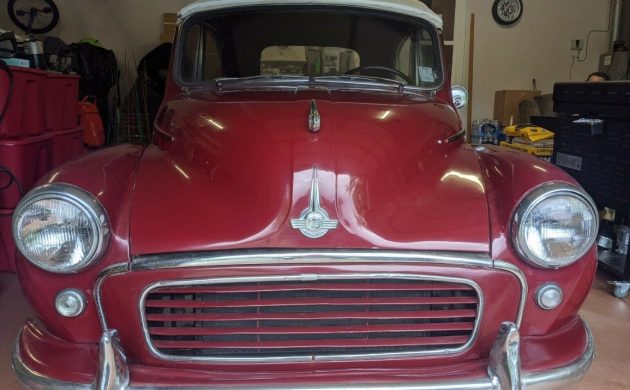
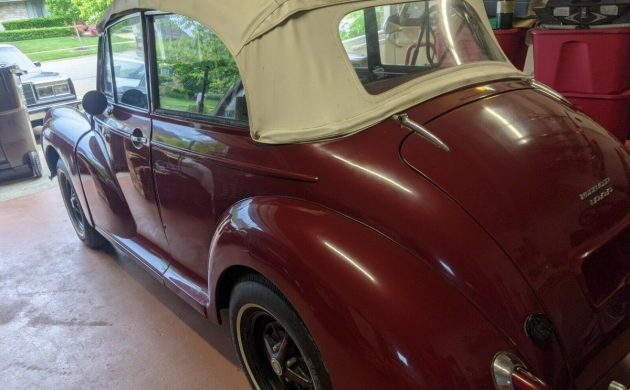
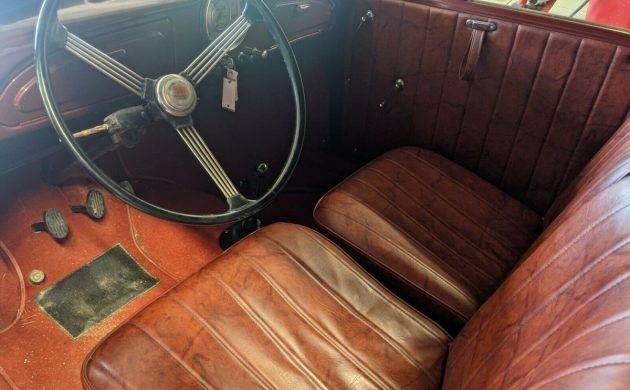
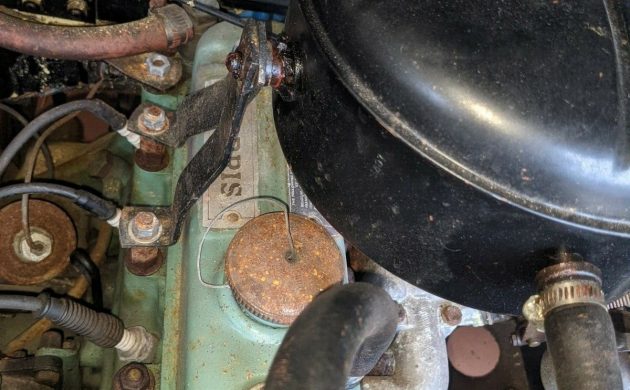
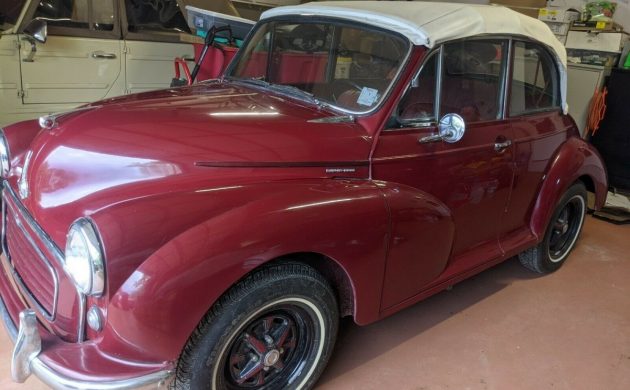



Wheels are ’70s Rothchilds that came on the later Sprites and Midgets. MGA was disc wheels with caps or wire wheels. Got two or three friends nuts about the Morris Minors, one having a pickup, two door and four door sedan. Pretty simple and used BMC running gear so parts are readily available. My high school Biology teacher drove a green convertible. Always great to have a cool teacher teaching you how to cut up a frog.
My best friends dad bought one of these when we were 11 years old and took the body off then rigged it up as a go cart for us with only the seats put back in. We drove it all over the fields behind his house . That thing was a fast go-cart, lol.
you sure it was a Morris? MMs are unibodies.
Heavy corrosion/rust on everything under the hood, including the alum. intake, oil fill cap, head bolt nuts, etc..
Left bumper guard took significant hit, right is rusted thru.
All diecast has significant pitting. Rear bumper is from another car (paint is wrong on valance).
Speedo has been disassembled, missing lenses over gen and oil lights. I have owned many of these over any years and have never had a reason to take a speedo head apart. I’ve never seen two needles on a speedo.
Windshield gasket, Yikes.
]The Pirelli straps under the seat cushions have perished, which is why they sag in the middle.
The lack of any bottom pictures means RUN, do not walk away from this one. It shows many signs of wet storage, and Morrust Minors disintegrate while you sleep.
All the items this Morrie needs are readily available, and this car needs them all.
I’m always suspicious when the photos are sideways. It’s hard to recognize stuff like the speedo being messed with.
Ditto to Mr. Morris. Buy the best example you can find. Convert to a 5 speed. Add front disk brakes. Wear it out.
I agree with the aptly named Mr. Morris. While cute and fun to drive (slowly) the Brits perfected rust on the Morris Minor. Annual injections of “Wax-Oyl” were mandatory to keep the tin worm at bay. The sill (rocker) assembly is constructed of something like seven separate pieces of metal, with all the cavities for moisture to accumulate. The photo of the rear edge of the front wing shows typical rust popping up and the one of the rear edge of the doors shows sanding marks in the bondo underlying the paint. No underbody pix adds more caution as these were unibody cars and a common failure point is the crossmember that serves as the anchor point for the torsion bars and also serves as the jacking point on either side of the car. The wheels were probably changed because of the near impossibility of locating the very narrow 14 inch rubber used on the original rims. I have five nicely cleaned up original wheels left over from when I traded my project Traveller for the TR7 presently in my driveway (no snide comments, please, the Morris was too much of a project for this 76yo and the 7 runs, mostly) an the new keeper would have nothing to do with them..
$10K is ambitious for a car with as many unanswered questions as this one has. As to the comment about getting stuff from Moss, mechanical only and then only if you know what is shared with LBCs that they do support. The rest would have to come from places like Bull Motif in the UK or Kip Motors in TX or possibly Mini Mania. If I were in the market (am not) I might offer $5K and hope for the best.
I looked a a very similar sedan about 4 or 5 years ago, the owner claimed a 20yr previous new paint job and an MG 1500 engine dropped in and running quite well, was asking $3000 which seemed fair at the time , when I looked under the floorboards were semi intact but from the frame to the outer skirts were missing. Everything in the wheel spin zone was rusted away but the frame portions were still intact but there could be more issues with a closer inspection . He also had several extra engines , and transmissions in a pile and a Morgan 8 sitting amongst the debris, there also was a bright orange 70s Mini in the back yard that he had already sold for a mere $5000…I had brought a tow bar with me thinking If I purchased it I could tow it back legally .. he told me the tires on the car wouldnt tolerate this .. I decided to pass, he dropped the price $2500 including all the engines and transmissions I wanted , then $2000 finally $1500. .. I left .. to this day I do regret it, everything underneath could have been fixed without any fear of cosmetics being disturbed.
The ¨revolutionary Mini¨bla, bla, bla. Issigonis copied the design of the Goliath 700 (in terms of layout); he was NOT an originator but rather a plagiarizer. The fact that he got away with it is telling, for it is impossible that the automotive writers of the time didn.t know about the Goliath 700 which even featurerd fuel injection at a time when even mighty GM was struggling with it. No, no, no, this Mini adoration is undeserved.
Gerard Frederick,
You are very correct, the Goliat 700 was designed 10 years before the Mini, and produced from 1950 to 1953. But we should point out there are 3 major mechanical differences between the Mini and 700 engine; the Goliat 700 is a 2 cylinder, air cooled unit, while the Mini is a 4 cylinder water cooled unit.
The 3rd difference is where Sir Alec made his mark; he combined the engine and gearbox on the Mini into one unit, saving enough side-to-side space to make it all fit. The Goliat engine, being half as long, allowed the engine & gearbox to sit side by side.
There were 2 types of Goliat 700 cars; the 4 passenger 2 door sedan, and a swoopy, streamlined GP Sport version, with a side view similar to the Porsche 356 of the time. I have been told the GP Sport body was built by Rometsch, but I have not found proof this is correct, but it sure looks like something the company would have created.
I am familiar with this car because in the spring of 1975, while living in Germany, I was offered a running and driving GP Sport for the total cost of 100DM, about $30 back then. It didn’t pass the latest TUV [vehicle inspection] because of rust issues, and I decided not to buy it. I was also warned by the owner of a local repair garage I had befriended, that mechanical spare parts were almost impossible to find for the 700.
Thank you Bill! I was not aware of the engine-transmission configuration of the Mini. Another difference between the two is the engine of the Goliath was a 2-stroke powerplant, a very popular configuration in Germany until the strange demise of DKW. To my knowledge the Goliath GP 700 Sports Coupe was designed by Herr Borgward himself; I have never heard of the Rometsch possibility, but it certainly is interesting since Rometsch designed a number of very pretty body styles, mostly convertibles I think. As an aside, the Goliath sport coupe was really quite gorgeous.
Gerard,
My own personal belief is the Goliat 700 Sports was a far better looking car than the Porsche 356. And yes, I had forgot it did have the “blue smoke” motor!
For everyone else not familiar with these beautiful cars, here is a link to a modern photo of one. The caption indicates it was built by Karossiere Rometsch.
https://i.pinimg.com/originals/81/fe/b2/81feb203b33d361acf26dd79f770652e.jpg
Thanx Bill, you are a prince! The photo shows the car to be even better looking than I remembered.And indeed, it was Rometsch – which results in the question: ¨Who needs Pininfarina?¨
The bankruptcy of Borgward/Goliath is an interesting story itself. The most generally believed story is that it was engineered by Mercedes. Borgward was the fourth largest German manufacturer. There is even a movie The Borgward Affair, Die affare Borgward, unfortunately only in German. The story is here: https://en.wikipedia.org/wiki/Borgward#Controversial_company_bankruptcyan.
Indeed, Mercedes engineered the demise of the Borgward concern. They used a simple trick – they went to Deutsche Bank and gave them the choice, you either finance us, or Borgward, neveer both. Mercedes was by far the larger corp and the more lucratice customer, ergo Borgward bit the dust. This underhanded maneuver was really criminal because Borgward was not only manufacturing first rate cars but trucks, 4-wheel drive military vehicles and daily transportation cars such as the Lloyd.They were especially dangerous for Mercedes in the military truck field as well as in the personal luxury car area, where the Isabell coupe was something Mercedes simply couldn´t match. The Lloyd aravella, was marketed under the Borgward nameplate. Its pancake-engine subsequently fornmed the basis of all Subaru engines.
I had a LHD Minor come in to the shop for a brake overhaul. To remove the brake master cylinder, the first thing to do is take out the front seats! Then the front floor panel comes out, just to be able to see the master cylinder, because it’s located inside the left frame channel.
I also found out that some of the very early “low headlight” LHD cars [like the one in my shop] had the 2 bolts that hold the master cylinder in place, installed from the wrong side [before the whole assembly was attached], and the bolt heads have to be cut off and the bolts pulled thru from the threaded end. So the job may require installing 2 new bolts the correct way. [Because of interference issues, the LHD cars need the bolts inserted in the opposite way than the RHD cars.]
Because there is no seat in place when bleeding the brakes, I suggest you use a vacuum bleeder system, rather than try to pump the brake pedal by hand.
test
When I was about twelve or so my parents, my sister and myself headed to Arizona from Iowa in a little Morris convertible much like the one here.
We brought a long our hundred and fifty pound Bull Mastiff. What a trip
Gerold Fredrick. Thanks for the info on the Lloyd My dad had one of this as well. Ours was a little station wagon. So the Lloyd was from zGermany?
Loyd was a small german manufacturer who was bought by Borgward in the late 20´s or early 3’´s, I think. They built small economy cars with 2-stroke engines for the man who couldn´t afford a bigger car, the price being close to that of a medium size motorcycle. The car was sold very well in India where it was used as a taxi. The last one was the steel bodied ¨grown up¨ Alexander TS, featuring a 600 cc 4-stroke twin (I think). The previous Lloyds all had a wooden body, covered in vinyl-like material, much like the pre war DKW´s. Borgward even designed a 350cc two-stroke Lloyd record car which establishe a variety of speed and endurance records.
I liked the lill station wagons they had. Some looked like lill versions of our ’50s panel vans (remember them B4 the ’12 passenger vans’ came out)?